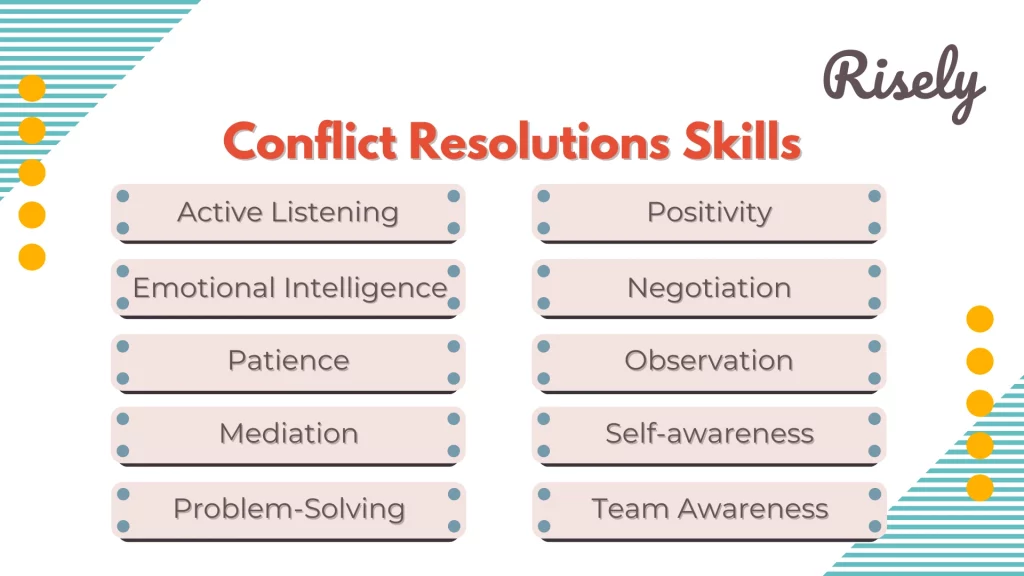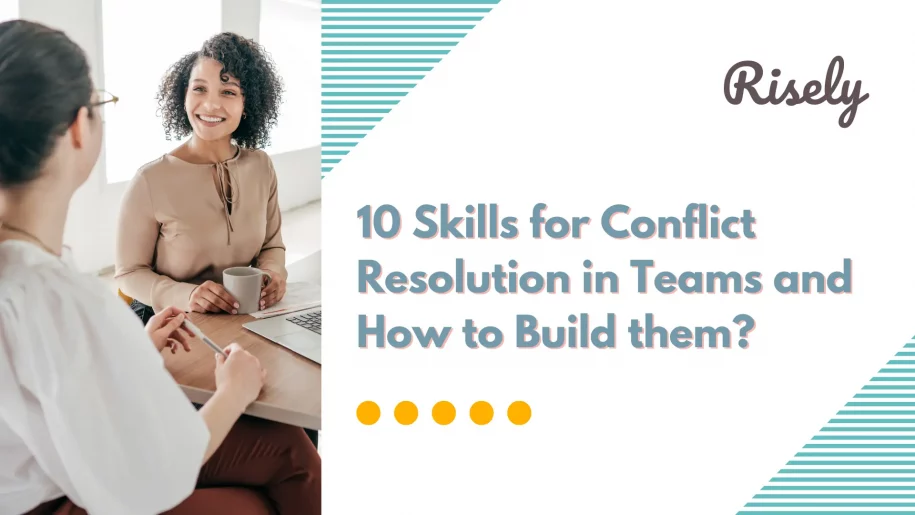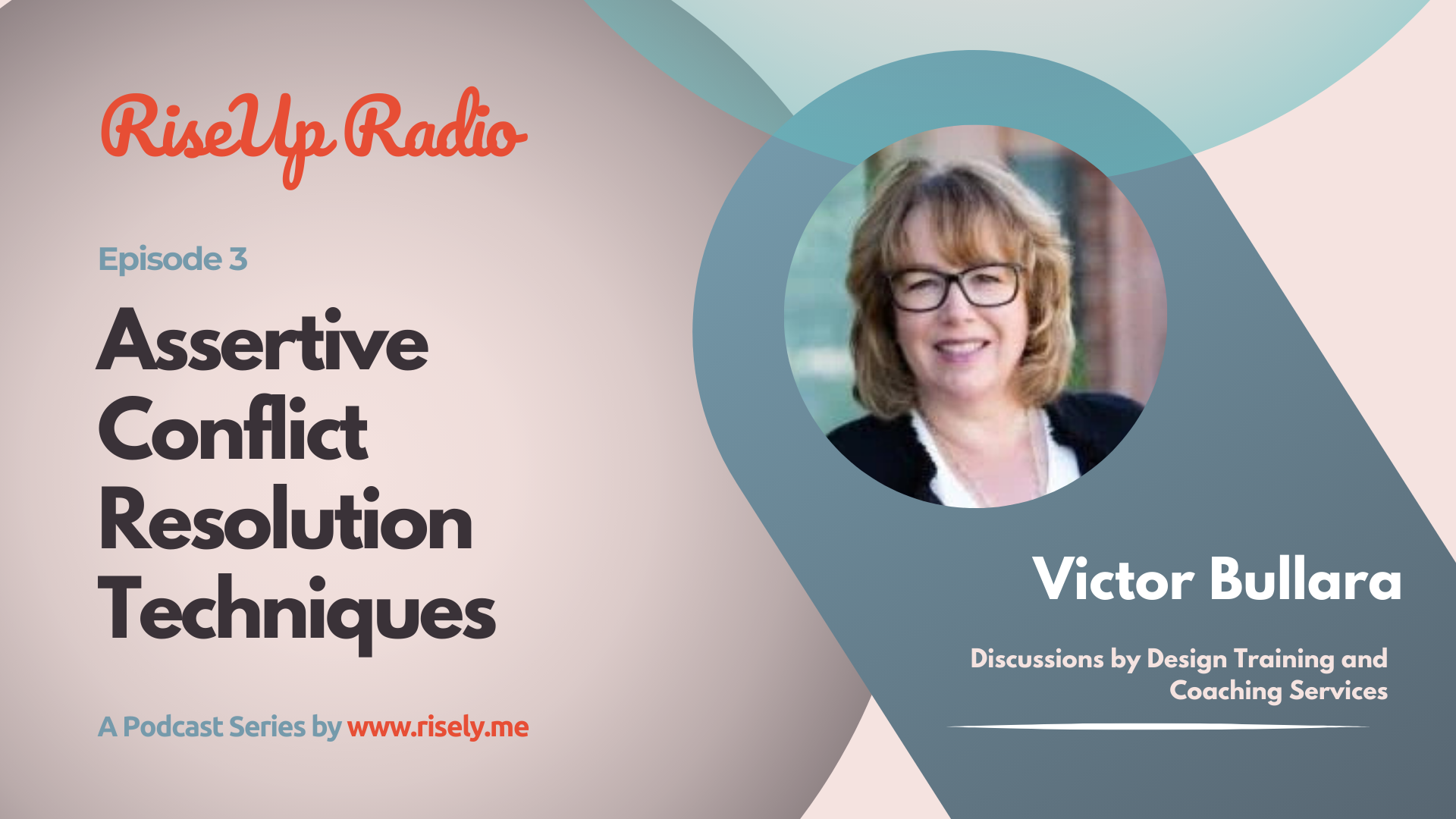10 Skills for Conflict Resolution You Must Have
Skills for Conflict resolution are the abilities required to resolve conflict, whether within a team or with a third party. These skills help anyone to work towards conflict resolution constructively and help them work towards mutual benefit and satisfaction. In this blog, we will talk about the ten essential skills for conflict resolution that every leader should possess to create an environment of peace, understanding, and mutual respect in their organization.What is conflict resolution?
Conflict resolution is the process of resolving a dispute or disagreement between two or more parties by finding a solution that addresses the concerns of all parties involved. This process typically involves identifying the conflict, analyzing the underlying causes, exploring different options, and finding a mutually agreed upon solution. Effective conflict resolution can help to improve communication, increase understanding, and build stronger relationships among the parties involved.What are the Essential Skills for Conflict Resolution?
Skills for conflict resolution refer to the abilities and techniques that help individuals effectively manage and resolve conflicts. These skills are essential for any individual, especially for leaders, managers, and individuals in positions of authority. These skills can help individuals to understand the perspectives of others, identify common ground, and find mutually beneficial solutions. They also help to reduce tension and prevent conflicts from escalating. To become proficient at these skills, it’s best to focus on developing them one step at a time. Start by practicing communication skills with all parties involved in the conflict. With practice and guidance, anyone can hone their conflict resolution skills and become an asset to any team or organization.
Why do Leaders Need Conflict Resolution Skills?
Skills for conflict resolution are essential for managers and leaders to lead a team effectively. It’s crucial to be able to resolve conflict peacefully and non-violently, whether it’s among team members or external stakeholders. The skills for conflict resolution help individuals work through conflicts and disagreements quickly and confidently. In addition, this allows managers to develop trust and cooperation within the team, leading to better teamwork and productivity. When managers have the skills of conflict resolution, they can reduce stress levels and overall anxiety, which aids in their performance. These skills also help individuals resolve conflicts non-violently, which is essential for positive mental health and employee well-being. Lastly, conflict resolution skills can help individuals work more productively as a team, making everyone happier and more fulfilled in the long run.Skills for Conflict Resolution in the Workplace
Conflict resolution skills refer to individuals’ abilities and techniques to effectively manage and resolve conflicts. These skills are essential for anyone, but particularly for leaders, managers, and individuals in positions of authority. Conflict management skills can help individuals understand and navigate the different causes and dynamics of conflicts and find mutually beneficial solutions. In addition, strong conflict management skills can lead to improved relationships, increased productivity, and a more positive work environment. We will now delve into the important skills for effective conflict management.
Active Listening
Active listening is one of the crucial skills for conflict resolution. When actively listening, you focus on what the other person is saying and not interrupting or speaking over them. By paying attention to the other person’s point of view, active listening allows the other person to feel heard and understood, leading to conflict resolution. It is also essential to be open-minded and non-judgmental during active listening. Being open-minded helps you explore different perspectives and ideas without becoming frustrated or taking sides. By listening non-defensively and actively, you will better understand the conflict from the other person’s perspective and find a solution that works for both parties. Are your active listening skills up to the mark? Test now for free with Risely!Emotional Intelligence
Emotional intelligence is the ability to perceive, manage, and control emotions in oneself and others. Understanding, expressing, and effectively handling emotions are vital for conflict resolution. EI skills help improve communication and relationships and therefore is included in the vital skills for conflict resolution. A manager must be able to communicate and understand emotional cues in both verbal and nonverbal ways. Additionally, it keeps conflict from escalating and helps to work toward a resolution. Successful conflict resolution requires emotional intelligence skills from all parties involved-from, from policymakers who can set clear goals while listening to the needs of all parties and mediators who use empathy to understand the situation from multiple perspectives better.Other Interesting Reads
Patience
Resolving conflict is a challenging but essential part of any relationship. It can be frustrating when an argument escalates quickly to the point of no return. But patience is critical to resolving conflict successfully. Managers need to take their time and not rush into a decision. When one is trying to resolve a conflict, it helps to step back and understand the other person’s point of view to develop a solution that works for both parties. By listening carefully and taking time to think about the situation, you can diffuse tense situations and build trust between you and the other person. All in all, patience can be one of the key skills for conflict resolution.Mediation
Mediation is a process by which a third party helps to resolve a dispute between the parties involved. It is an alternative to litigation or going to court, allowing parties to work out their disagreement without needing a judge or law enforcement officer. The mediator is typically impartial and has experience in resolving disputes. Different types of mediation, including collaborative mediation, facilitation, and dispute resolution panels, are available to help parties resolve their conflicts. The goal of mediation is to reach a resolution that is acceptable to all parties involved. It is often a vital step in conflict resolution, as it allows the conflict to be brought to the surface and discussed openly to find mutually agreeable and beneficial solutions for all involved.Problem-Solving
Problem-solving skills are vital for conflict resolution. They help recognize and address the root causes of conflicts by identifying the issues and exploring possible solutions. Managers can apply the five problem-solving steps for conflict resolution: identify the problem, list possible solutions, evaluate the solutions, choose one solution, and implement it. People can find creative and equitable solutions to their conflicts by applying problem-solving skills.Positivity
Positivity in the workplace is one of the critical skills for conflict resolution. When conflict arises, it’s essential to be positive and constructive in addressing the problem. Negativity can lead to conflict escalation and long-term problems. Instead, positive thinking can help prevent negative emotions from taking over and affecting your ability to think clearly. As a result, you’ll be able to solve the conflict better and move forward with your goals. This attitude will help you reach your goals and create a more positive, productive work environment.Negotiation
Negotiation is trying to reach an agreement between two or more parties. It can be used to resolve disputes and conflicts and is integral to conflict resolution. Negotiation skills can be learned and practiced, and one can apply them in various situations. Therefore, it is vital to have effective negotiation skills to help achieve successful outcomes in any case. Negotiation is one of the powerful skills for conflict resolution, and it can help bring parties together to work toward a common goal. However, it takes communication skills and creativity to negotiate and resolve issues effectively and successfully; it’s essential to understand the other party’s point of view, listen carefully to what they say, and strive for a win-win outcome. Read more: How Negotiation And Conflict Resolution Go Hand-In-Hand? With 5 Examples
Observation
Observation is the key to effective conflict management. When one observes a conflict, one can understand it better and find solutions that work for both parties. You must also be able to keep track of your emotions and reactions to remain impartial. The skills you need to be a practical observer will vary depending on the type of conflict you are dealing with. For example, if you are involved in a workplace conflict, it would be essential for you to observe how your coworkers interact and solve problems as a team. However, if you are involved in a conflict with a family member or friend, it would be vital for you to observe body language and non-verbal cues such as facial expressions and tone of voice.Self-awareness
An essential skill in the list of skills for conflict resolution is self-awareness. Self-awareness helps you understand your thoughts, feelings, and behavior, enabling you to identify the underlying causes of conflicts. Once you thoroughly understand the source of conflict, you can begin resolving it using other conflict management skills and techniques. Self-awareness also helps you in identifying any biases you might have as a manager.Team Awareness
A conflict resolution team must have the skills to work together effectively. One of the skills that are essential for conflict resolution is team awareness. This skill helps managers understand their team dynamics and how they interact with each other. In addition, it can help resolve conflict before it escalates into a severe issue. This skill helps a manager to make their teams work through their differences and reach a consensus on a solution.
Skills for Conflict Resolution Examples
You can practice several skills for conflict resolution to help you navigate difficult situations more smoothly. Below are a few examples of skills you can use when dealing with conflict.- Active Listening: A manager is in a meeting with a team member who is expressing frustration over a new project. The manager uses active listening skills to fully understand the team member’s concerns by asking clarifying questions, paraphrasing and showing empathy.
- Problem-Solving: A manager is trying to resolve a conflict between two departments over the use of a shared resource. The manager uses problem-solving skills to identify the root cause of the conflict, generate potential solutions, and evaluate the pros and cons of each option.
- Negotiation: A manager is trying to resolve a conflict between a customer and a sales representative over a product issue. The manager uses negotiation skills to find a compromise that satisfies both parties by identifying the underlying interests of each party and proposing a win-win solution.
- Observation and team awareness: A manager notices that there is a lot of tension and disagreements among the team members. The manager finds out that the team members are not aware of each other’s strengths and weaknesses, which is causing confusion and misunderstandings. The manager facilitates team-building activities to help team members understand and appreciate each other’s skills and work styles. As a result, the team members start to communicate more effectively, and conflicts are reduced.
How to improve conflict resolution skills?
Improving conflict resolution skills involves both self-awareness and effective communication techniques. Here’s how you can enhance your conflict resolution skills:- Develop Self-Awareness: Reflect on your triggers, biases, and emotional responses to conflicts. Understand your communication style and how it might affect conflict dynamics.
- Stay Calm: Maintain emotional control during conflicts. Take deep breaths and practice relaxation techniques to prevent emotional reactions from escalating.
- Seek Common Ground: Identify shared goals or interests that both parties can agree on. Finding common ground can provide a foundation for resolving differences.
- Focus on Solutions: Shift the focus from blame to finding solutions. Collaboratively brainstorm possible resolutions that address the core issues.
- Effective Communication: Use “I” statements to express your feelings and perspective without accusing others. Be clear and specific in your communication to avoid misunderstandings.
- Empathy and Perspective-Taking: Put yourself in the shoes of the other party. Understand their feelings and motivations to show genuine empathy.
- Timing: Choose the right time and place for discussions. Avoid addressing conflicts when tensions are high or during busy periods.
Conclusion
Effective conflict resolution requires a combination of skills and techniques, including active listening, problem-solving, negotiation, compromise, and the ability to remain calm and composed under pressure. The skills for conflict resolution described in the blog can help managers to understand the perspectives of others, identify common ground, and find mutually beneficial solutions. Additionally, strong conflict resolution skills can lead to improved relationships, increased productivity, and a more positive work environment. Managers need to develop and hone these skills to effectively manage and resolve conflicts in the workplace or personal life.Download the free conflict management toolkit for rising managers now!
Uncover the secrets of handling conflicts like a pro in your team.
Conflict Resolution Skills FAQs
What is basic conflict resolution?
Basic conflict resolution stands for the process of seeking a solution to a team conflict through formal and informal methods in a peaceful manner.
How do you handle conflict?
Effectively handling conflict as a manager needs you to be clam and empathetic to all the sides. Moreover, you should have an objective understanding to create an amicable resolution acceptable to all the parties.
How to avoid conflict?
Creating good relations through healthy and direct communication habits can help managers avoid team conflicts. Empathy and compassion are important values in this process.
What is conflict prevention?
Conflict prevention refers to the actions of managers undertaken with the aim of reducing the probability of a conflict occurring. These steps are taken before the conflict happens.
Other Related Blogs
Assertive Conflict Resolution Techniques | Brenda Hooper
Assertive Conflict Resolution Techniques | Brenda Hooper Can assertive communication help you out in resolving conflicts? In this podcast conversation, we have Brenda Hooper, an experienced executive coach joining us…
7 Conflict Resolution Scenarios At Work For Practice
7 Conflict Resolution Scenarios At Work For Practice Conflict resolution is one of the most important people management skills you must master. If conflicts on your team go unresolved, you…
Conflict Coach 101: A Beginner’s Guide
Conflict Coach 101: A Beginner’s Guide Did you know? Since 2008, we have doubled the hours we spend in conflicts at work. Research by the Myers-Briggs Company suggests that an…
5 Secrets To Conflict Resolution At Work For Managers
5 Secrets To Conflict Resolution At Work For Managers Conflict is all too common. We often encounter this ever-present demon in our workplaces, too. The trouble is manifold for managers…


